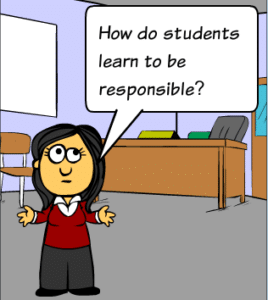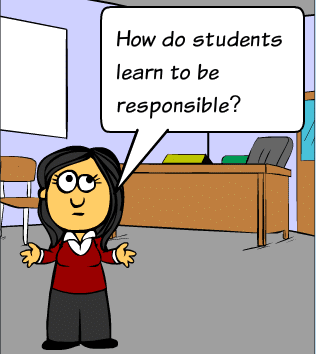I have repeatedly seen the concept of “responsibility” held as a higher value than learning the content. I recently saw a forum post by a teacher whose students had submitted work in Google Classroom but it was being labeled as “Late.” The student insisted they had submitted it on time so it was in question as to whether the teacher should accept the students work. Frankly, this saddened me. Valuing a label on a computer over student learning. The teacher is telling this student “I do not trust you” even though when the teacher went to view the work the assignment was there. Whether or not the student is lying about missing an arbitrarily set time for the due date, the teacher was not inconvenienced at all. Rather than giving the student the benefit of the doubt the teacher gives the student the message that their learning was not what was important but rather whether or not they could press a submit button by a certain time.
When I taught High School Algebra I would tell my students that I played World of Warcraft. Some of the boys in class would look at me and question “You play World of Warcraft Mrs. Keeler?” They would then go home and look up my character on the game. I am a casual player so they would come back with all kinds of advise for me on how to have better gear and things for my character. “Oh thank you, that is so helpful” I would tell them. This small interchange helped some students to feel they had a connection with me and that was reason enough for them to do math homework where normally they would not. Relationships matter in teaching. If a student feels you are being unfair to them or perceive that you value rules and procedures above them as people they may cut off their nose to spite their face, but they will not do work or try as hard in your class.
How did students being responsible rank higher than students learning, in my case, algebra? Why do some teachers feel their highest mandate is to teach kids to be responsible? There is no Common Core standard (or state standard that I know of) that says this is the job of a teacher. When we focus on rules and grades this can detract from the real goal of having a student learn and have a life long passion for learning.
Research
“teachers relating well to their students remains one of the most significant factors in generating positive academic and social outcomes.”
Keddie, A., & Churchill, R. (2005). Teacher-student relationships. Teaching middle years: rethinking pedagogy and assessment, 211-225.
“positive teacher-student relationships are associated with optimal, holistic learning.”
Cornelius-White, J. (2007). Learner-centered teacher-student relationships are effective: A meta-analysis. Review of Educational Research, 77(1), 113-143.
“Research has shown that the teacher–student interpersonal relationship (TSIR) is important for student motivation.”
Maulana, R., Opdenakker, M. C., & Bosker, R. (2014). Teacher–student interpersonal relationships do change and affect academic motivation: A multilevel growth curve modelling. British Journal of Educational Psychology,84(3), 459-482.










2 thoughts on “There is No Standard to Teach Responsiblity”
That’s a beautiful and a useful post! I teach biology to undergraduates and my experience is exactly the same – students respond better when they feel the teacher cares about them. Unfortunately, there is very little personalism present in the student-teacher relationship in college teaching.
Thank you Manoj. I also am teaching college. Some things I do to increase my connection with students is each week they fill out a Google Form and I respond to them individually using a mail merge Add-On. This allows me to hear from every student in my class. The other thing that is really helping is using Google Classroom. It is so much easier to give students feedback before they submit their work. This morning I noticed several of my students had not started their assignment in Google Classroom and I was able to send them a note with some suggestions to help them get started. I would not have been able to do that without Google Classroom.